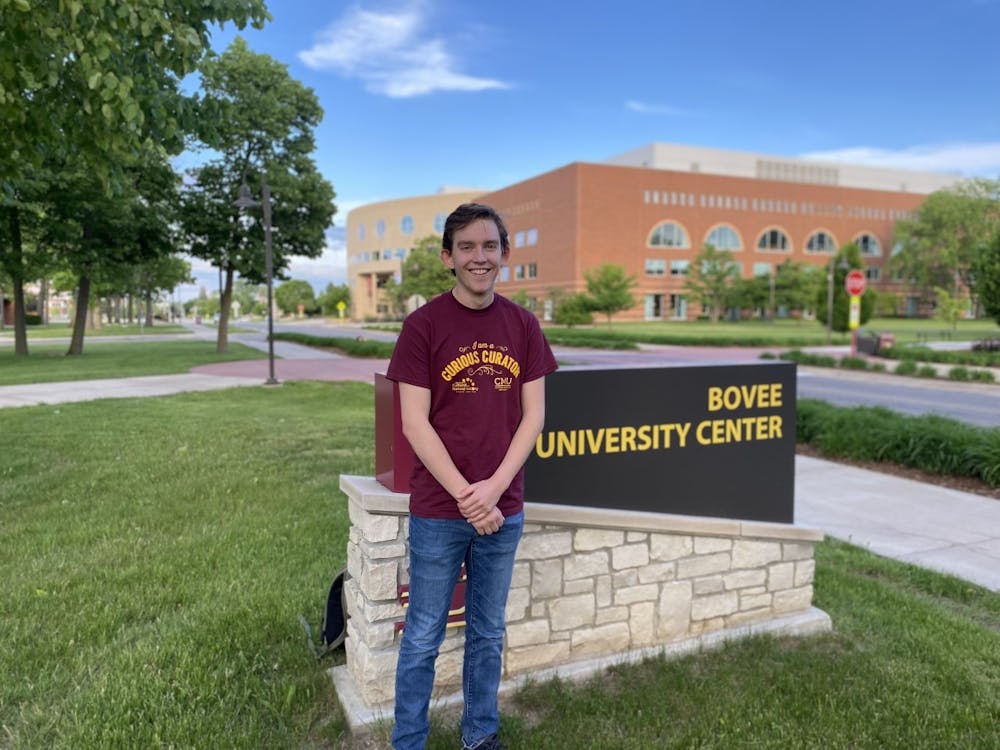CMU senior Joe Monetta wins Provost Award for work to amend the Federal Shipwrecking Act of 1987

As an interest that was sparked during a special Great Lakes Shipwrecks class, Joe Monetta has worked to amend the Federal Shipwrecking Act of 1987 for nearly three years as an undergraduate.
Now, as a senior at Central Michigan, Monetta has won the Provost Award for his research and work to amend the Act.
Monetta is a history student at CMU. He grew up in Holland, Michigan but moved to southern Indiana with his family for the duration of high school. He came back to CMU because he felt like it was a good-sized school compared to the bigger state schools in Michigan.
Monetta has been involved in the Student Government Association, the Mock Trial Association, volunteering with Peer Mentors and Community Council.
The Federal Shipwrecking Act, which Monetta took interest in, is a law that was created to protect shipwrecks from looting and to preserve the artifacts found on them for future generations and be collected as Government property. The law has a loophole in its wording, which is what Monetta has been working to amend.
The act, passed in 1987, went into effect after being signed in 1988.
“(The act) clarified some of the confusion about shipwrecks by having the federal government assert ownership of all shipwrecks in American navigable waters,” said Jay Martin, Director of CMU Museums and maritime historian and archaeologist.
Monetta took a special topic class with Martin during his freshman year of college about Great Lakes shipwrecks, which is where he was introduced to the 1987 Federal Shipwrecking Act. Through this class, Monetta and other students attended a conference on underwater cultural resource management where they presented in front of state and marine archeologists from around the Great Lakes.
Wanting to go into law school, Monetta was intrigued by a project that Martin proposed in class about a loophole in the Federal Shipwrecking Act of 1987.
“One of the things (the Act) specifies is embeddedness, which doesn't protect shipwrecks that land on rock or end up with their bow being down in a pit but they're not actually buried in the sand,” Monetta said. “So, I am suggesting that we replace ‘embedded in’ with ‘adjoined to’, which is just touching or contiguous to remove that loophole that allows looters to take from these ships.”
Monetta went to Professor Smith of CMU's history department for help with finding a replacement word for the Act but ultimately found his solution in Black’s Law Dictionary.
“’Embedded’ wasn't defined in Black's Law Dictionary because it doesn't really show up in any acts outside of this,” Monetta said, “but ‘adjoined to’ does show up in other laws and is well defined, so it made sense to me to replace it with an already defined word that has legal precedent.”
Monetta said that he felt honored when Martin nominated him for the Provost Award, one of the highest undergraduate research awards at CMU.
“It means a lot to know that professors here at CMU recognize our work,” Monetta said. “I feel like they are good at recognizing students.”
Martin said that one of CMU’s highest undergraduate research awards is the Provost Award, which is the award Monetta received for his research work.
“He hasn't changed the law yet, but the nature of coming up with substitute language and the elegance of that the simplicity and elegance of changing just a couple of words out for a couple of other words that will solve a problem surgically without creating a bunch of problems and hopefully not much controversy is brilliant,” Martin said.
After Dr. Martin submitted Monetta for the Provost Award, the process had to go through multiple rounds and take multiple months before hearing anything back about receiving the award.
“I feel very honored to be acknowledged like this,” Monetta said. “I'm a part of CMU's history at this point, which is very cool.”
To their knowledge, Martin and Monetta do not believe that any other student has lobbied to change a federal law, or come close to it.
“The cool part about this,” Monetta said, “is seeing how much power I have as a college student to change a federal law.”
Monetta is now just waiting on a response from a potential sponsor of the bill.
“I know CMU does have students who have had major impacts on our nation's history,” Monetta said. “We have a lot of at alumni that have done great things, but yeah, I don't know if there is anyone who's lobbied as an undergraduate student to change a federal law.”
According to both Martin and Monetta, there are a lot of interesting artifacts laying on the bottom of the Great Lakes from these shipwrecks.
“To be able to see it with all the bottles still in place or all the cargo still there, that's exciting,” Monetta said. There are also pianos and fighter jets rumored to be preserved in the lake as well.
Monetta believes that the amendment of this Act is especially important right now due to the upcoming 250th anniversary of the American Revolution, where people will be wanting to hunt for new artifacts from that time period.
Martin hopes that this bill gets sponsored and is able to be signed into law for Monetta and to prove to students that they can make change as an undergraduate.
“My hope is that Joe is able to achieve this and that should be an indication to all CMU students that really you can make a big difference if you set your mind to something, do the research, get some people behind you, and work toward a solution that's good for everybody,” said Martin.
There is a petition up on Monetta’s Facebook account that anyone can sign in support of getting the amendment to the Federal Shipwrecking Act of 1987 passed.
Those interested can find the petition here: https://chng.it/CPh7KvhK



